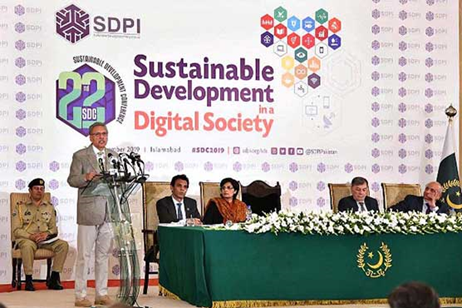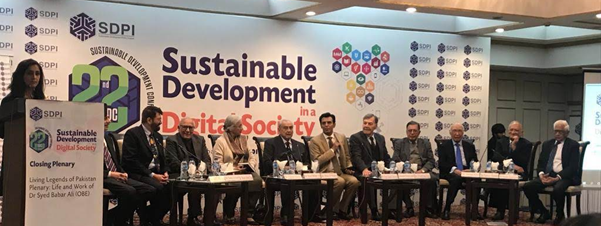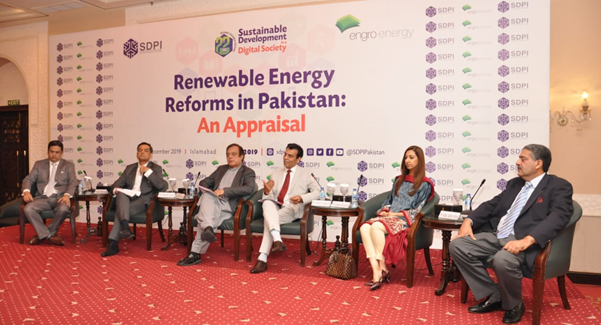22nd Sustainable Development Conference of SDPI-Pakistan themed, “Sustainable Development in a Digital Age” held in Islamabad, 2-5 Dec 2019
Go Back

The 22nd Annual Sustainable Development Conference (SDC) 2019 organized by the Sustainable Development Policy Institute (SDPI) Pakistan in Islamabad on 2-5 December 2019. Theme of the conference was; “Sustainable Development in a Digital Society”. The conference was opened by the President of Islamic Republic of Pakistan, H.E. Dr. Arif Alvi on 2 December at the Presidency. In the inaugural plenary the two key note speakers were; Dr. Sania Nishtar, the Chairperson/Federal Minister of Benazir Income Support Programme (BISP) and Mr. Haroon Sharif the former Chair of the Board of Investment.

The President in his speech appreciated the SDPI for regularly organizing this Sustainable Development Conference and said the present conference theme is very close to his heart as he strongly believes that in today’s digital age Pakistan must push ahead. He also spoke about his initiative of Artificial Intelligence (AI) to be launched soon in Pakistan. He further highlighted the AI in healthcare provision, agriculture, and waste reduction in industrial and commercial operations. The president urged the private sector, universities and independent researchers to bridge the communication gap of policies and implementation to enable Pakistan face the coming revolution confidently.
Special Assistant to the Prime Minister, Dr Sania Nishtar said Ehsaas Program is a multi-sector and multi-component programme encompassing 130 agendas and policy initiatives. Government is engaging and taking onboard all stakeholder to achieve desirable outcomes, she added.
The next Plenary Session on December 3, was opened by the Minister of Planning & Development and Reforms Mr. Asad Umar, who spoke on the importance of transparency and communication on all aspects of development and finance in public domain with the use of digital tools. He said it is unfortunate that Pakistan is an elite captured society and we all need to strive for a society and political system where elite influence can be mitigated. He emphasized the need for introducing and implementing wealth tax which has fundamental place in the advance economies.
Overall the conference contained around 250 talks in 35 plenary sessions and attracted participants from 18 countries. On behalf of ECOSF, its President Dr. Manzoor H. Soomro and Scientific Officer Engr. Khalil Raza joined the conference and contributed in sessions on Energy, Food & Agriculture, Ecofeminism, Mother Languages, Digital Activism for Human Rights Movements etc. The final and Closing Plenary was to celebrate the Living Legend Syed Babar Ali (OBE) for his contributions in the sectors of Business, Development, Education and Philanthropy. A number of senior and distinguished of Syed Baba Ali’s network in Pakistan were invited to speak on his contributions; finally he also spoke to the audiences and thanked them all and the SDPI for acknowledging his efforts.

SDPI in collaboration with Engro Energy organized a policy session on “Renewable Energy Reforms in Pakistan: An Appraisal” in Islamabad on December 3, 2019. The panel discussion was held as part of ongoing.
The objective of holding this session was to generate a dialogue amongst private power sector representatives and government agencies to provide an enabling environment to promote the renewable energy development in the country. Senetar Shibli Faraz was the guest of honor and chaired the session, while Dr. Abid Qayyum Sulhari moderated the discussion. A number of executives of private power companies, energy regulators and government sector entities, lawmakers, energy experts and representatives of development partners participated in the panel discussion. On behalf of ECOSF, Engr. Khalil Raza participated in the event.
Senetor Shibli Faraz in his remarks assured that the government is committed to promote sustainable energy with the prime motive to produce cheap, clean and green energy for the sustainable future of Pakistan. He underlined for the need to employ the Integrated Energy Planning (IEP) to optimize the energy mix and create fine balance between demand and supply.
CEO Alternative Energy Development Board (AEDB) Dr. Abdul Jabbar Khan underlined that Government has launched the Renewable Energy Policy 2019 which aims to increase the share of renewables in the energy mix to 25% and 30% by 2025 and 2030, respectively. AEDB is working to introduce competitive bidding to bring the cost of electricity down, he further added.

Dr. Sardar Mohazzam, Managing Director National Energy Efficiency Conservation Authority (NEECA) emphasized that demand-side management is the key to reduce the inefficiencies in the energy sector. NEECA has a critical role to play and implement various energy efficiency measures to address the exorbitant crisis of Circular Debt in the country. Dr. Mohazzam assured that NEECA will take prudent measures to improve efficiencies in entire energy supply chain and promote competitiveness in the energy market.
Mr. Shahab Qadir, Vice President Engro Energy shared that Engro Energy aspires to promote indigenous energy resource to achieve energy security and supply low-cost power to the country. Engro Thar Coal is an ideal manifestation of capabilities we have and the potential of public-private partnership to take on challenging energy projects and deliver them on time to improve energy security in the country, he said.
Dr. Fatima Khushnood representative of Independent Power Producers (IPPs) underscored that power sector needs restructuring especially in the transmission and distribution sectors and as well as discontinue the utilization of inefficient power plants to create competitive environment. We need to have consistent policies to attract private sector investment in the country, she added.
Engr. Khalil Raza, during the discussion, emphasized that Pakistan has undertaken many reforms in the energy sector. Unfortunately, all those reforms have been targeted at supply or generation side, while neglecting the demand-side management. This is the high time that relevant government agencies to develop management strategy and bring reforms in transmission and distribution sectors to address the circular debt.